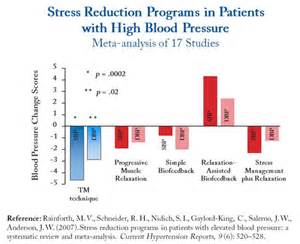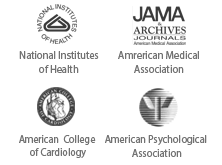Sign up for:
- Information on TM research and webinars

Interview with Robert D. Brook, MD
Chair of the AHA Comittee that wrote the report “Beyond Medications and Diet—Alternative
Approaches to Lowering Blood Pressure: A Scientific Statement from the American Heart Association”
It is common for patients to ask, “Is there a way I can treat my blood pressure without medication?” Until 2013 there had not been a critical review or statement by an authoritative cardiology body on non-pharmacologic, non-dietary ways to improve blood pressure. That was the year the American Heart Association issued the report “Beyond Medications and Diet—Alternative Approaches to Lowering Blood Pressure: A Scientific Statement from the AHA” to inform physicians which alternative approaches have been shown by research to be effective.

After considering meta-analyses and the latest clinical trials on different types of meditation and relaxation techniques, the report stated that the Transcendental Meditation technique is recommended to lower blood pressure, and may be considered in clinical practice for the prevention and treatment of hypertension. At the same time, it stated that there is not currently enough scientific evidence to recommend other meditation or relaxation techniques to lower blood pressure.
Dr. Robert D. Brook, M.D., chair of the AHA committee that wrote the report, is Director of the Hypertension Center and Associate Professor of Medicine at the University of Michigan’s Division of Cardiovascular Medicine. Here he answers questions about the AHA statement.
Q: Can you talk about the research on the TM technique and how it stood up under review?
Dr. Brook: We chose several broad categories of non-pharmacologic, alternative approaches to hypertension, including exercise, device-guided approaches such as slow breathing and biofeedback, and stress reduction approaches such as meditation.
In the stress reduction category, we focused on the more recent studies of Transcendental Meditation and other types of meditation such as mindfulness, contemplative meditation, and focused attention. Separate meta-analyses and our review of the research on TM showed a fairly clear overall reduction in blood pressure, about 4 or 5 mmHg systolic. Using the AHA’s metrics, we graded TM rather high based on the evidence.
TM stood alone amongst all of the meditation techniques because of the great deal of research and corroborative evidence. There were far more studies in relation to blood pressure and hypertension on TM as compared to other meditation techniques. There also were three meta-analyses (a collection of many studies) that corroborated that TM was effective for lowering blood pressure.
Q: Why was TM the only meditation technique recommended in this report?
Dr. Brook: I would say there is a lack of compelling evidence that other types of meditation and stress reduction techniques, including yoga, are as effective in reducing blood pressure.
This doesn’t mean that they don’t reduce blood pressure. It’s just that there is a lack of compelling or good evidence that they do. In comparison, there is good evidence that TM is effective in modestly lowering blood pressure. That is why it stood out and was selected amongst the meditation techniques. I say this with the caveat that as better trials are done, it may well be that some of the other techniques will be found to be effective as well.
Q: I’m curious. Are you a practitioner of the TM technique?
Dr. Brook: No. I am not an advocate; I am not an activist. I’m not coming from the inside at all. This is an external review by somebody who is somewhat of a skeptic. The studies show what they show and the publications are what they are. I didn’t come in knowing anything about the TM technique.
Q: Since doing this research, do you recommend TM to your patients?
Dr. Brook: Absolutely. A population-level reduction of 5 mmHg systolic is a profound 10-15% reduction in heart attacks, strokes, and cardiovascular disease.
At the same time, I don’t want to overstate the effect of TM on blood pressure, which is modest but still helpful. It’s a good adjunct for people who have mild hypertension or upper-normal levels, what we call pre-hypertension. Or it can be helpful as a supplement for people who have intolerances to blood pressure medications, or who aren’t at goal on one or two medications and don’t want to add a third pill.
You can do TM for many other reasons, and if as an ancillary benefit it also helps to lower blood pressure, that’s a wonderful side effect.

